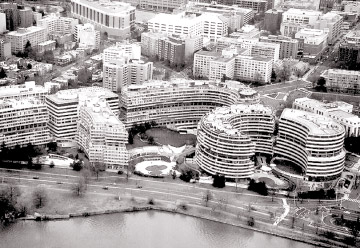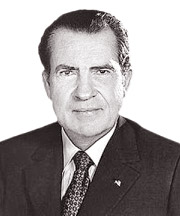|
DEAR NGO PANIC-WALLAHS:
Impeachment process identical to US Senate process
Dr Kamal Wickremasinghe
 |
|
Dr Kamal
Wickremasinghe |
Even the most ardent supporters of the CJ, including the NGO-wallahs
do not appear to want to draw attention to the specifics of her alleged
misbehaviour, but rely on the charge she did not receive a ‘fair trial’.
In support of their position, they seem to turn, in an extremely vague
manner, to the US Constitution and impeachment practice in the US.
A careful examination of the language of the US
Constitution,impeachment debates in the US Senate, and enlightened
discussion on the subject by US Constitutional law experts would have
showed them that none of these sources support the use of their
particular “standard of proof”they insist should be applied in such
trials.
At best, the US constitutional provisions concerning the power of
impeachment provide only indirect guidance in analysing the question of
what standard of proof is, or should be, applicable to Senate
impeachment trials: Article I (Sec. 2, clause 5)confers on the House of
Representatives “the sole Power of Impeachment” and the Senate the Power
to “try” all Impeachments; Sec. 3, clauses 5 and 6 prescribe that
Judgment in Cases of Impeachment shall not extend further than removal
from Office and disqualification to hold and enjoy any Office of honour,
Trust or Profit,but the convicted Party shall be liable and subject to
Indictment, Trial, Judgment and Punishment, according to Law.
Article 2 of the Constitution pronounces that: “The President, Vice
President, and all Civil Officers of the United States, shall be removed
from Office on Impeachment for and Conviction of, Treason, Bribery, or
other high Crimes and Misdemeanours.” Article 3 provides that, “The
trial of all Crimes “except Impeachment”, shall be by Jury....”
(Emphasis added).
As the above quotes show, these constitutional provisions are silent
on the standards of proof to be applied during impeachment trials, but
significantly limit the consequences of a Senate impeachment trial to
removal from office and disqualification from holding office in the
future, explicitly preserving the option for a subsequent criminal trial
in the courts.
 |
|
The
Watergate complex in Washington, D.C. |
In doing so, the Framers have expressly rejected some elements of
criminal law of the English impeachment model they borrowed, such as
criminal punishment including forfeitures of life, property and liberty.
Historically, the US Senate has rejected the analogy of impeachment
trial to a criminal proceeding;This issue becomes central to the
discussion on the degree of standard of proof needed in impeachment
trials.
Criminal proceeding
The position that proof beyond a reasonable doubt is required has
been advanced, as to be expected, by defendants in impeachment
proceedings. Their argument is usually based on the use of words in the
Constitution such as “try,” “convicted” and “conviction”, to draw a
parallel between impeachment and a criminal proceeding where the
standard of proof required is “beyond a reasonable doubt”. This position
was enunciated in the Minority Views contained in the Report of the
House Judiciary Committee on the impeachment proceedings against
President Nixon.
The House Managers who present the case for impeachment have
consistently disagreed with this view and have applied the lower civil
standard of proof of “preponderance of the evidence”.
The debate and vote in the 1986 impeachment case of the district
court judge Harry Claiborne for tax evasion provides the most recent as
well as thorough discussion on the standard of evidence to be used in
impeachment cases: in the Senate trial, Claiborne’s attorneys filed a
motion to designate beyond a reasonable doubt as the applicable standard
for the Senate in reaching its determination. They argued that an
impeachment trial was in the nature of a criminal proceeding,with grave
consequences for the defendant, and required the prosecutors to be held
to the highest standard of proof in all criminal trials, beyond a
reasonable doubt.
The response of the House Managers in opposition to the Claiborne
motion noted that the reasonable doubt standard was designed to protect
criminal defendants who risked “forfeitures of life, liberty and
property”, citing Brinegar v. United States, 338 U.S. 160, 174 (1949).
Such a standard was inappropriate, they maintained, because of the
nature of the impeachment and the trial process.
Following the minority (opposition) initiated floor debate on the
motion it was concluded, inter alia, that 1. the Senate had never
adopted such a standard of proof; 2) that historically, the Senate had
allowed each member to exercise personal judgment in these cases and
3)that the proceeding was not a criminal trial and use of the criminal
standard was inappropriate where the public interest in removing corrupt
officials was a significant factor.
Constitutional requirements
The Senate refused to impose the reasonable doubt rule as the
standard in the Claiborne case, by a vote of 75-17, and the Presiding
Officer left individual members of the Senate free to apply a standard
of their choice.
The essence of the Senate’s winning argument was that a criminal
standard of proof was not required in impeachment trials since criminal
sanctions could not be imposed. They also contended that the criminal
standard was inappropriate in an impeachment because it is a proceeding
where the public interest weighed more heavily than the interests of the
individual defendant, which were adequately protected by the
constitutional requirements of the parliamentary process.
 |
|
Richard
Nixon |
 |
|
Bill
Clinton |
They recommended a “preponderance of evidence” standard to ascertain
whether Judge Claiborne intentionally filed a false tax return.
The issue was revisited during discussions at the organisational
meeting of the1989 Senate Impeachment Trial Committee against District
Judge Alcee Hastings, Florida's first black federal trial judge, for
engaging in a "corrupt conspiracy" to extort a $150,000 bribe in a case
before him. He had been acquitted of the crime by a jury.
In response to Senator Joe Lieberman’s request for help in
understanding guidance the common law of American impeachment provided
as to the “threshold the evidence has to cross for us to make a judgment
of guilt or innocence against this judge”, Senator Warren Rudman
replied: “I think it is going to be whatever you apply to it. I think it
is what everybody decides for themselves.”
The Senate voted 69 to 26, five votes more than needed,to impeach
Hastings on the basis of an alleged criminal offence he was found not
guilty of by a jury. The Senate impeachment of Hastings,stripping him of
his lifetime, $ 89,500-a-year position, clearly shows that the standard
of proof for the US Senate impeachment process is lower than a beyond
reasonable doubt. Beneath the surface of the vote to impeach would have
been the Senate suspicions that the courts always looked after their
own!
Watergate scandal
Some academic commentators have urged the adoption of a middle ground
between the usual civil standard and the criminal standard of proof in
impeachment trials: Professor Ronald D. Rotunda, Professor of
Constitutional law at Chapman University School of Law who served in the
investigative team of the Watergate scandal,and was advisor to Kenneth
Starr during the unsuccessful Clinton impeachment, wrote in “An Essay on
the Constitutional Parameters of Federal Impeachment, (L.J. 707,
719-20,1988) that the appropriate standard of proof should be “clear and
convincing evidence”, defined as “that measure or degree of proof which
will produce in the mind of the trier of facts a firm belief or
conviction as to the allegation sought to be established.”
The US Senate has declined to establish an evidentiary standard,
leaving it a matter for the conscience of each Senator, from among three
established standards: beyond a reasonable doubt, clear and convincing,
and preponderance of evidence. In the final analysis, the US practice
recognises that each Senator is both judge and juror.
Parliamentary Select Committee
The US Senate position is founded on the fundamental differences
between the purposes of an impeachment proceeding and a criminal trial:
the purpose of impeachment is to defend the community against abuse of
power by judges, and unlike in a criminal proceeding, it only involves
removing a respondent from office, without consequence on life, liberty,
or property.
Impeachment is essentially a political proceeding, designed to
safeguard the reign of public interest in a democratic society and
therefore the lower standard of “preponderance of the evidence” is the
appropriate standard.
The beyond a reasonable doubt standard is too deferential to the
judge and is unfair to the public in that in practice, a person whom
most citizens believe would be guilty of corruption could remain on the
Bench of the Supreme Court, just because guilt was not shown “beyond a
reasonable doubt.”
In sum, the US Senate has traditionally left the choice of the
applicable standard of proof to each individual Senator. The Senate
overwhelmingly rejected a motion to make the criminal standard the
standard in the Claiborne impeachment in 1986. The current standard is
that each individual senator applies evidentiary standard of their
choice.
The consideration by the Parliamentary Select Committee (PSC) in our
case would not have been any different and the case of the CJ’s
defenders is not supported by precedence in their jurisdiction of
choice, the US.
It appears that the CJ’s legal team have been clutching at straws. |







